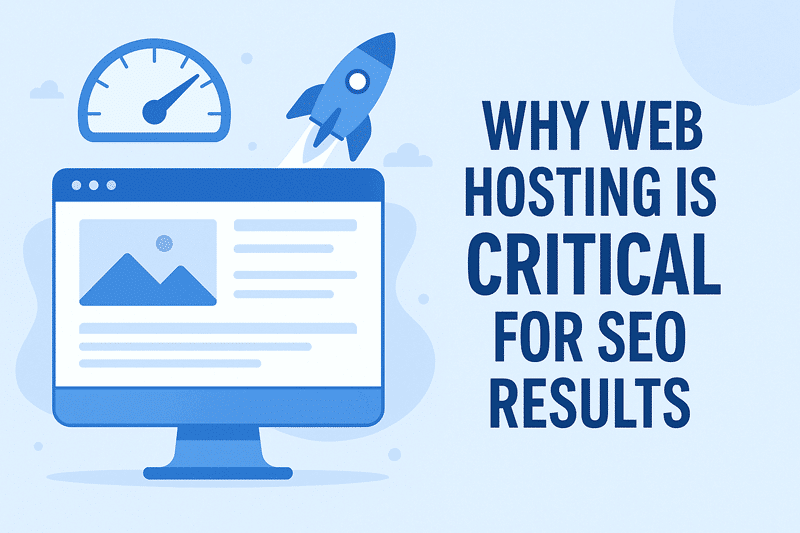
Here’s the truth straight up: your hosting is either helping your SEO… or quietly killing it. No middle ground. Search engines don’t care how pretty your site is if the server behind it is slow, unstable, or misconfigured. So here’s a forward-leaning, no-BS breakdown you can publish as a blog post.
Why Web Hosting Is a Critical Factor to Maximize SEO Results
Most business owners obsess over keywords, backlinks, and content—but ignore the foundation everything sits on: your web hosting. Google evaluates far more than your page copy. It evaluates the entire experience behind your site, and that experience is driven directly by the server powering it. If your hosting is weak, your SEO ceiling is permanently capped.
Below are the core reasons why hosting is one of the most critical (and most overlooked) SEO factors.
1. Speed = Rankings. And Speed Starts With Your Server.
Google has been blunt: site speed matters.
Not “matters eventually”—matters now, on every search result.
Your hosting provider determines:
-
How quickly your server responds (TTFB)
-
Whether your site can handle PHP/MySQL efficiently
-
How fast static assets are delivered
-
Whether caching is optimized at the server level
A slow server means a slow site, even if you optimize everything else. And slow sites get pushed down.
If your hosting can’t consistently keep your pages loading under 2 seconds, you’re putting yourself at an automatic disadvantage.
2. Uptime and Stability: Google Won’t Rank a Site It Can’t Trust
If your site drops offline—even for a few minutes—Google notices.
Downtime hurts SEO in two ways:
- Search crawlers hit errors and reduce crawl frequency.
- Users hit broken pages, increasing bounce rates.
Cheap hosting cuts corners on:
-
Redundant power
-
Network routes
-
Server monitoring
-
Hardware quality
Your SEO shouldn’t depend on whether a budget server decides to cooperate today.
3. Server Location Impacts Local and Global Rankings
Where your server physically lives affects your:
-
Latency
-
Regional ranking signals
-
CDN behavior
Google wants to deliver the best regional experience.
Hosting a U.S. business on a random European server? Expect slower times and weaker U.S. rankings.
If you want to dominate local SEO, your hosting footprint needs to be strategically placed—ideally with data centers close to your target markets.
4. Security Signals Are Now Part of Core SEO
Security isn’t optional. Google tracks:
-
Malware
-
SSL configuration
-
Server vulnerabilities
-
Hacked pages
-
Spam injections
If your host doesn’t proactively harden servers, patch systems, isolate accounts, or monitor threats, your site is a target—and once you’re compromised, rankings tank hard.
A secure host protects both you and your SEO from disasters you’ll never even see coming.
5. Core Web Vitals Depend on Hosting Quality
You can’t fix Core Web Vitals if your server is garbage.
The hosting provider affects:
-
Largest Contentful Paint (LCP)
-
First Input Delay (FID) / INP
-
Cumulative Layout Shift (CLS)
-
Time to First Byte (TTFB)
A well-optimized server with modern PHP, NVMe storage, HTTP/2 or HTTP/3, and properly configured caching will outperform any “shared bargain bin” host every time.
Your theme, plugins, and content ride on top of the infrastructure. If the foundation is weak, everything above it fails.

6. Crawl Efficiency: Faster Servers = More Googlebot Activity
Google allocates crawl budget based on your site’s performance.
If your site loads slowly or throws intermittent errors, Google crawls it less often. That means:
-
New content takes longer to appear in search
-
Changes take longer to be reflected
-
Old or outdated content stays indexed longer
Better hosting increases crawl frequency and improves the freshness of your search results.
7. Managed Hosting Eliminates Problems Before They Cost Rankings
Quality hosting providers don’t just offer space—they run actual optimization layers:
-
Server-level caching
-
CDN integration
-
LiteSpeed/NGINX performance tuning
-
Proactive security
-
Backups
-
Auto-scaling resources
-
Real-time monitoring
This removes bottlenecks before they become ranking penalties.
You shouldn’t be fighting with your server. You should be focusing on your business.
Conclusion: SEO Starts at the Server Level
If you’re serious about ranking—truly serious, not “I hope this works”—you have to treat hosting as a core SEO investment.
The harsh truth:
- You can’t outrank competitors if your hosting is dragging you backward.
- You can’t fix speed issues with plugins if your server is slow.
- You can’t build authority on unstable infrastructure.
Upgrading your hosting is often the fastest, highest-ROI SEO improvement a business can make. It’s the one change that instantly impacts every page, image, script, and visitor.
Your SEO strategy is only as strong as the server behind it.











